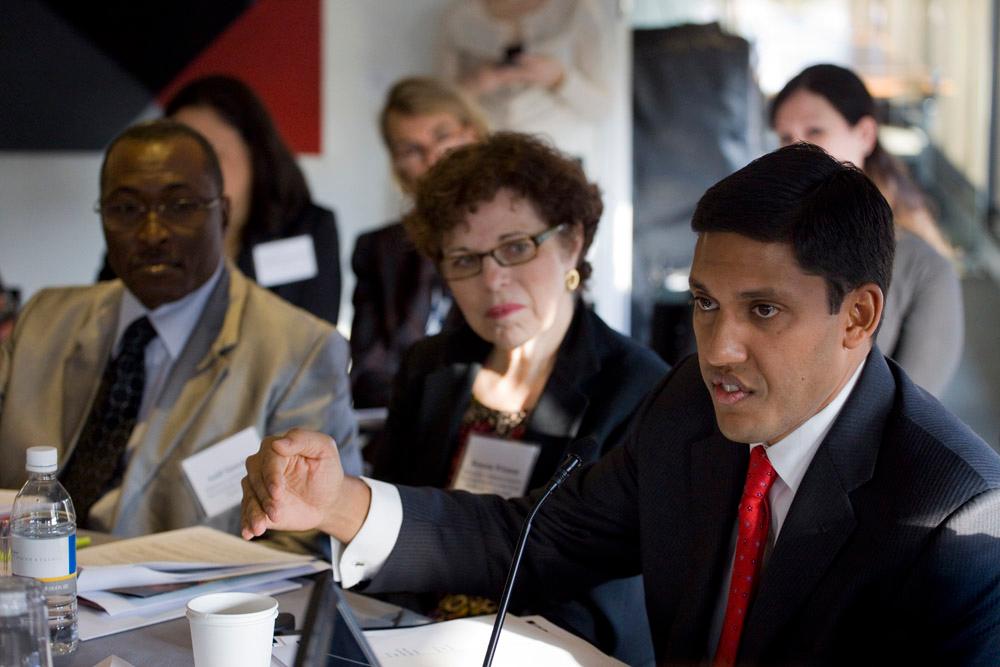US officials pledge to let health aid recipients decide
USAID administrator Rajiv Shah, right, speaks Thursday at a meeting in Washington, D.C. on country ownership of health programs. Left are Dr. Salif Samake, a senior Mali health official, and Rosann Wisman, director of the Ministerial Leadership Initiative for Global Health.
WASHINGTON, D.C. — One of the Obama administration’s key strategies in saving millions of lives of people in the developing world is to do something that on the surface sounds straightforward: let the countries themselves set the agenda and be in charge.
The idea is that countries know what’s best for them.
This principle is one of the foundations of Obama’s Global Health Initiative, but a roundtable on Thursday organized by the Ministerial Leadership Initiative for Global Health (MLI) showed why it’s not so simple. Still, several senior US officials said they were committed to building up country ownership, along with systems that closely monitor spending.
Looking around a room of several other senior US officials, developing country leaders, and heads of non-governmental organizations that do tens of millions of dollars of work in health around the world, USAID Administrator Rajiv Shah told the group: “We are here in force today because we want to learn about country ownership in order to shift the way we work to adopt these principles, and take on that task and challenge.”
Shah reminded the group that the potential long-term benefits of successful programs “under the leadership of strong country leaders” were huge: “We’re looking at the end of AIDS, we’re looking at the end of child deaths from malaria, and more broadly we’re starting to see a vision — 10 or 15 years away — of eliminating all preventable child deaths.” Experts estimate that 6 million children die each year from preventable illnesses.
But how do donors take such goals and also listen to country leaders’ priorities in health, and then find common ground? And what about Congress’ major concerns about letting developing countries decide how to spend U.S. assistance?
Addressing corruption
Ethiopian Health Minister Tedros Adhanom Ghebreyesus, speaking by video hookup in Addis Ababa, directly addressed the issue of corruption.
“Speaking candidly, we know the concerns of donors,” he said. “Some even say, ‘Why give to developing countries, whose authorities would siphon it to their pockets?’ But donors should not abandon programs because of an incident of corruption. The countries should fight corruption not just for the sake of the donors, but we should do it for the sake of our people and of our country.”
Minister Tedros said that countries with well-thought out visions and strategic plans will get more accomplished than a basket of scattered donor programs.
“Developing countries should be in the driver’s seat,” he said. “They know what is best for their countries.”
MLI, a five-year project funded by the Bill & Melinda Gates Foundation and the David and Lucile Packard Foundation, worked with health ministries in five countries, including Ethiopia. It points to several examples of success when countries lead the planning, request specific types of help, and meet with other developing countries to talk about what types of programs worked – and what didn’t. For instance, Mali and Senegal officials traveled to Rwanda to learn how it put together a health insurance scheme. Mali now is ramping up its health insurance plan.
Radical changes needed
During Thursday’s meeting, Dr. Mark Dybul, the former US global AIDS ambassador under the Bush administration, challenged the group, and particularly the US officials at the meeting, to radically change the way aid is given in order to make country ownership a reality.
“Fundamentally, the existing structure of (donors) is not built to support country ownership,” Dybul said. “Until we step back and rapidly change that fact, we are going to be dancing around the issue for another 10 years. We’re talking about a structure built for 50 years ago, where we have a junior Foreign Service officer lecturing a Minister of Health about how they should run the system. That’s the fact of how we are trained in this country, and the multilaterals are no better. Often they are worse.”
Said Dybul: “Often we have this patina of country ownership and say we believe in it, but we actually don’t and don’t function that way.”
Sitting next to Dybul was Amie Batson, the Deputy Assistant Administrator of Global Health for USAID. Batson turned to him later in the meeting and said, “It’s great that this started off with Mark putting the gauntlet down.”
“At the top levels of US government, we are committed to change,” she said. “Then it comes to reality, changing the bureaucracy and systems and what you do on Monday morning.”
Batson described US officials as “sitting between all these different and opposing voices. If you ask countries what the US government has done in the past, they will say, we don’t listen, don’t have much dialogue and not been very transparent. If you talk to the Hill (Congress) about greater country ownership, you hear, ‘We need to deliver all the results, but we cannot tolerate any risk.’ Those are hard-earned dollars, and if there is one egregious act, it ends up damaging the whole system.”
“That is the world we sit in. Are we serious? Yes. Is there are a commitment to change? Yes.”
Joseph Dwyer, project director of Leadership, Management and Sustainability Program at Management Sciences for Health, a U.S. implementer of health programs, said after the meeting that Batson was correct. “There has been a sea change in the last few years in this administration’s policies toward advancing country ownership,” he said.
